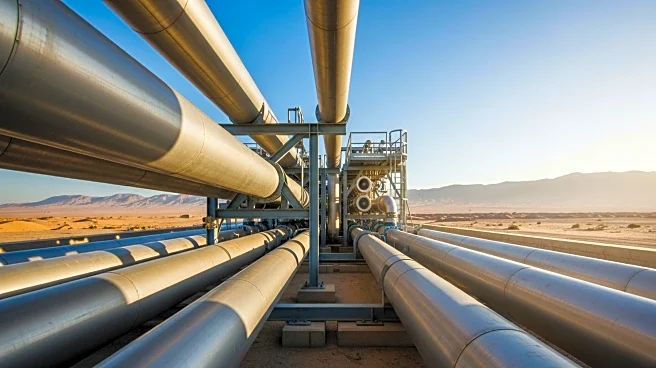What is the story about?
What's Happening?
Desalination technology, traditionally used in the oil-rich Persian Gulf, is now being adopted by countries facing severe water shortages, such as Morocco. The Agadir desalination plant in Morocco converts seawater from the Atlantic Ocean into water for drinking and agriculture, providing a lifeline amid a seven-year drought. This technology is seen as a solution to climate change-induced water scarcity, with Morocco planning to build four of the world's largest desalination facilities by 2031. However, the process is energy-intensive and can lead to environmental issues, such as brine discharge into the sea.
Why It's Important?
The expansion of desalination technology is crucial as global water shortages become more acute due to climate change. Countries like Morocco are investing in this technology to sustain agriculture and provide drinking water, which is vital for economic stability and food security. However, the environmental impact and high energy demands of desalination pose challenges. The technology's reliance on fossil fuels can increase greenhouse gas emissions, highlighting the need for renewable energy integration. The success of these projects could influence other water-scarce regions to adopt similar solutions.
What's Next?
Morocco plans to increase its desalination capacity significantly, with future plants aimed at supplying water directly to farms and cities. The government is also working on water reuse and transfer projects to complement desalination efforts. As desalination technology spreads, countries will need to address its environmental impacts and energy requirements. The integration of renewable energy sources into desalination plants could mitigate some of these issues, making the technology more sustainable in the long term.
Beyond the Headlines
Desalination is not a panacea for water scarcity. While it can provide immediate relief, it may not be sustainable for all regions due to high costs and environmental concerns. The technology's expansion could lead to increased geopolitical tensions over water resources, especially in regions where water scarcity is already a contentious issue. Additionally, the reliance on desalination could shift focus away from other sustainable water management practices, such as conservation and efficient irrigation.

















